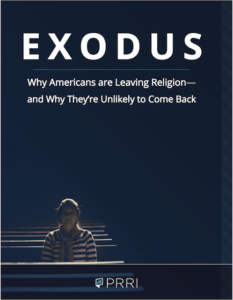A new study seeks to shed light on why people are leaving religion in the United States.
 From the summary,
From the summary,
“The American religious landscape has undergone substantial changes in recent years. However, one of the most consequential shifts in American religion has been the rise of religiously unaffiliated Americans. This trend emerged in the early 1990s. In 1991, only six percent of Americans identified their religious affiliation as “none,” and that number had not moved much since the early 1970s. By the end of the 1990s, 14 percent of the public claimed no religious affiliation. The rate of religious change accelerated further during the late 2000s and early 2010s, reaching 20 percent by 2012. Today, one-quarter (25 percent) of Americans claim no formal religious identity, making this group the single largest “religious group” in the U.S.”
(For the executive summary, visit: here http://www.prri.org/research/prri-rns-2016-religiously-unaffiliated-americans/)
“Today, one-quarter (25 percent) of Americans claim no formal religious identity, making this group the single largest “religious group” in the U.S.“
According to the study, of the 25 percent of the country that are non-religious, 72 percent don’t spend much time thinking about God or religion. Although they don’t think about God, many still believe in God.
“Despite their lack of connection to formal religious institutions, most unaffiliated Americans retain a belief in God or a higher power. A majority of unaffiliated Americans say God is either a person with whom people can have a relationship (22 percent) or an impersonal force (37 percent).”
I’m reminded of this quote from Marcus Borg,

“When somebody says to me, ‘I don’t believe in God,’ my first response is, ‘tell me about the God you don’t believe in.’ Almost always, it’s the God of supernatural theism.” ~ Marcus J. Borg
Of the 25 percent of the country that isn’t religious, more than half believe God is something. Borg’s quote is perfect. They either believe in a God that doesn’t exist, or they reject a wrong version of God that some others do believe.
It’s important to ask what God they don’t they believe in. Especially in the context of why people leave religion.

They are leaving religion in steady and growing numbers, probably because as their faith grows, they reject all religion, instead of just rejecting primitive, undeveloped theories of God.
When most mainstream Sunday school classes teach idiotic, dumbed-down versions of Bible stories, young people reject the interpretations when they are old enough to read scriptures themselves. (It’s like mini Reformations, as young people read the Bible for themselves and reject what they were previously taught about religion.) If they don’t reject the simple version of God, they can often retain that version of God, into adulthood. The result is Biblically familiar but contextually ignorant ‘Christians’ with faith an inch deep and a mile wide. Unfortunately, these are the sorts of ‘Christians’ who make headlines, worship scripture and ignore the teachings of Jesus.
I don’t fault the people who are leaving and never coming back. The surprise is how low the numbers are, not how high. In the coming decades, the numbers will only increase. Because the God they are taught isn’t who God actually is.
“It is a way of being Christian in which beliefs are secondary, not primary,” writes Borg. “Christianity is a “way” to be followed more than it is about a set of beliefs to be believed. Practice is more important than “correct” beliefs. Beliefs are not irrelevant; they do matter. But they are not the object of faith. God is the “object” of commitment—and for Christians, God as known in Jesus.”
 Americans are leaving religion?
Americans are leaving religion?
Good.
Once free of religion, perhaps they can finally see the Way of Jesus, the message of love and compassion and sacrifice.
The Way of the God who created us in love, to be loved and to love.












